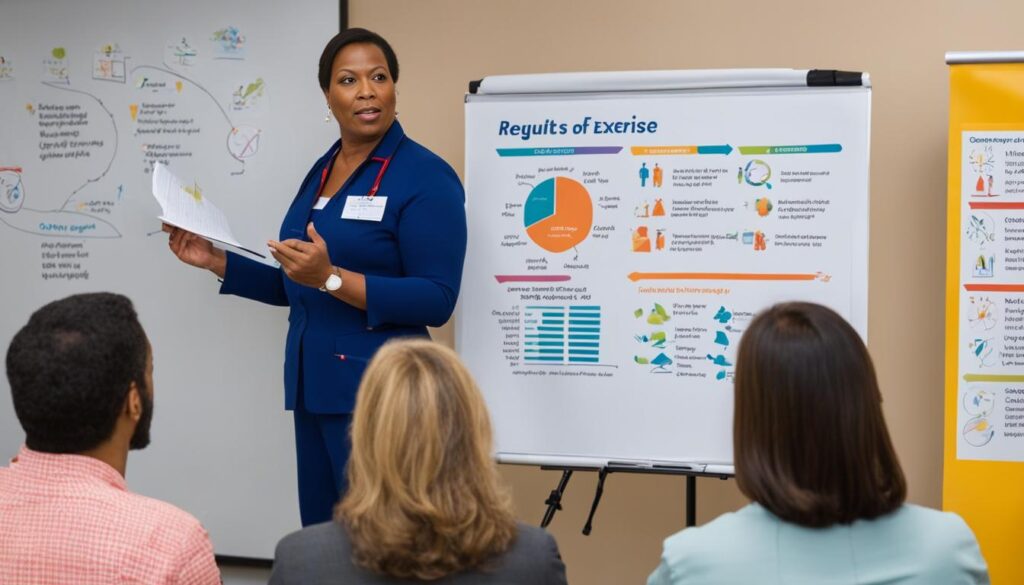As a healthcare professional, I understand the critical role we play in preventing obesity and promoting healthier lifestyles. To effectively guide our patients and advocate for prevention efforts, it is essential that we receive proper training in obesity prevention and lifestyle counseling. This training equips us with the knowledge and skills needed to interpret BMI percentiles, provide valuable nutrition and physical activity counseling, and develop effective motivational interviewing techniques.
Recognizing the importance of this training, healthcare professional associations should make it a requirement for all members. By doing so, we can ensure that every healthcare professional is well-equipped to support patients in making sustainable lifestyle changes.
Key Takeaways:
- Expert training in obesity prevention is essential for healthcare professionals.
- The training should cover interpreting BMI percentiles, nutrition counseling, physical activity guidance, and motivational interviewing skills.
- Healthcare professional associations should require this training for all members.
- Effective obesity prevention training enables healthcare professionals to support patients in making healthier lifestyle choices.
- This training plays a crucial role in preventing obesity and promoting overall well-being.
Training Recommendations for Healthcare Professionals
Healthcare professional associations play a crucial role in equipping professionals with the skills and knowledge needed to address the rising obesity epidemic. Training programs focused on obesity prevention strategies and behavior modification are essential in empowering healthcare professionals to make a significant impact on their patients’ health (see my post here).
Here are some key recommendations for healthcare professional training:
- Interpreting BMI Percentiles: Healthcare professionals should receive training on interpreting BMI percentiles for age to accurately assess their patients’ weight status and identify potential risk factors for obesity.
- Counseling on Nutrition and Physical Activity: Training should focus on counseling patients on healthy nutrition and physical activity, providing evidence-based recommendations tailored to individual needs.
- Developing Motivational Interviewing Skills: Behavioral modification training, such as motivational interviewing techniques, helps healthcare professionals effectively communicate with patients, inspire behavior change, and increase adherence to weight management strategies (check this post out).
By incorporating these training recommendations into healthcare professional education, we can empower professionals to take an active role in obesity prevention and encourage patients to make lasting healthy lifestyle changes.
Advocacy for Obesity Prevention

As healthcare professionals, we have a unique opportunity to advocate for obesity prevention efforts and make a positive impact on the health of our communities. By serving as role models within our practices and communities, we can inspire healthy changes in physical activity, nutrition, and the built environment.
We can start by advocating for policy changes that promote healthy eating and physical activity in various settings such as child care, schools, after-school programs, and communities. By engaging with policymakers and decision-makers, we can influence the development and implementation of evidence-based strategies that support obesity prevention.
Furthermore, we can encourage parents to advocate for environmental changes that promote physical activity. By providing educational resources and guidance, we can empower parents to engage with their child’s school or community to create environments that support healthy lifestyles.
Quotes:
I believe that healthcare professionals have a responsibility to not only treat individuals with obesity but also advocate for policies and changes that prevent obesity in the first place. By advocating for healthy eating and physical activity at all levels, we can create a society that promotes overall well-being and prevents obesity-related diseases.
As healthcare professionals, we are in a unique position to influence policy changes that can have a significant impact on obesity prevention. By collaborating with stakeholders, we can advocate for the development of comprehensive policies that prioritize the health and well-being of our communities.
Together, by leveraging our expertise and advocating for evidence-based policy changes, we can contribute to the prevention of obesity and create healthier environments for everyone.
Examples of Advocacy Efforts
| Advocacy Effort | Description |
|---|---|
| Collaboration with schools | Working with schools to integrate nutrition education and physical activity programs into the curriculum. |
| Supporting policy initiatives | Advocating for policy changes that promote access to healthy food options and opportunities for physical activity in underserved communities. |
| Engaging with community organizations | Partnering with local community organizations to organize events and campaigns that raise awareness about the importance of obesity prevention. |
SCOPE: Empowering Healthcare Professionals
The Strategic Centre for Obesity Professional Education (SCOPE) is dedicated to providing world-class training for healthcare professionals in the field of obesity prevention and management. Our comprehensive modules are designed to empower healthcare professionals with the knowledge and skills they need to support patients with obesity effectively.
At SCOPE, we understand the importance of continuous learning and professional development. That’s why our training programs are accessible online, allowing healthcare professionals to enhance their expertise at their own pace and convenience. Whether you’re a physician, nurse, dietitian, or any other healthcare professional, our training will equip you with the latest evidence-based strategies in obesity prevention.
Our training covers various key aspects related to obesity prevention, including weight management, nutrition, physical activity, behavioral counseling, and more. By enrolling in SCOPE’s training, you’ll gain valuable insights and practical skills that will enable you to provide effective care and guidance to patients on their weight management journey.
What sets SCOPE apart is our commitment to ensuring the highest quality of education. Our training modules are developed in collaboration with leading experts in the field of obesity prevention, ensuring that you receive up-to-date and evidence-based information. Additionally, our training is recognized and accredited by reputable organizations, allowing healthcare professionals to earn Continuing Medical Education (CME) credits while expanding their knowledge and expertise.
Join the thousands of healthcare professionals who have already benefited from SCOPE’s training and take the first step towards making a significant impact in obesity prevention and healthy lifestyle promotion. Enroll in our training program today and become a trusted advocate for obesity prevention in your community.
Benefits of SCOPE Training

SCOPE training offers numerous benefits for healthcare professionals in the field of obesity prevention and management. These comprehensive training modules cover a wide range of topics, providing invaluable knowledge and skills to support patients with obesity.
Nutrition Training
One of the key focuses of SCOPE training is nutrition education. Healthcare professionals gain a deep understanding of the role of nutrition in obesity prevention and management. They learn evidence-based strategies to help patients make healthier food choices, develop personalized meal plans, and understand the importance of balanced diets.
Physical Activity Training
Physical activity is essential for maintaining a healthy weight and preventing obesity. SCOPE training equips healthcare professionals with the tools to guide patients towards appropriate physical activity levels. They learn how to prescribe exercise programs, motivate patients to stay active, and tailor physical activity recommendations based on individual needs and preferences.
Fitness and Nutrition Training
SCOPE training goes beyond nutrition and physical activity to address holistic approaches to obesity management. Healthcare professionals learn about behavior modification techniques, addressing emotional eating, and promoting a healthy relationship with food and exercise. This comprehensive training ensures that they can effectively support their patients’ fitness and nutrition goals.
In addition to the extensive knowledge gained, SCOPE training offers professional recognition and accreditation. The training program is accredited by the European Accreditation Council for Continuing Medical Education (EACCME) and endorsed by NHS England and over 50 national associations globally.
“I found the nutrition and physical activity training in SCOPE to be incredibly valuable. It has given me the confidence and expertise to guide my patients towards healthier lifestyles and long-term weight management.” – Dr. Emily Johnson, Family Physician.
Accreditation and Endorsements
| Accreditation | Endorsements |
|---|---|
| European Accreditation Council for Continuing Medical Education (EACCME) | NHS England |
| Over 50 national associations globally |
Certificate Course in Obesity Prevention and Management

The Chellaram Diabetes Institute (CDI) and Public Health Foundation of India (PHFI) have developed a Certificate Course in Obesity Prevention and Management (CCOPM). This online course aims to develop the knowledge and skills of primary care physicians in the prevention and management of obesity. It covers topics such as introductory aspects of obesity, diet and lifestyle modification, pharmacotherapy, and bariatric surgery. The course is endorsed by the World Obesity Federation and offers SCOPE accreditation.
Obesity is a complex health issue that requires a comprehensive approach to address its prevention and management. With the Certificate Course in Obesity Prevention and Management (CCOPM), healthcare professionals can gain the necessary expertise to make a significant impact on the well-being of individuals affected by obesity.
In this course, primary care physicians will receive comprehensive training on evidence-based strategies for obesity prevention and management. The CCOPM curriculum covers a wide range of topics, including the introduction to obesity, the role of diet and lifestyle modifications, pharmacotherapy options, and the use of bariatric surgery as a treatment option for severe obesity.
The interdisciplinary nature of the course emphasizes the importance of teamwork in addressing obesity. Participants will learn about the collaborative approach involving various healthcare professionals, such as nutritionists, psychologists, and physical therapists. By acquiring these interdisciplinary skills, healthcare professionals will be better equipped to provide comprehensive care and support to patients with obesity.
The CCOPM is designed to be accessible and interactive, allowing participants to learn at their own pace and engage with fellow healthcare professionals from around the world. The course materials are presented in a user-friendly online format, with engaging multimedia content, case studies, and interactive quizzes to enhance the learning experience.
Upon completion of the CCOPM, healthcare professionals will receive SCOPE accreditation, recognizing their commitment to ongoing professional development in obesity prevention and management. This accreditation serves as a testament to their expertise in the field and demonstrates their dedication to providing high-quality care to individuals affected by obesity.
CCOPM Course Structure
| Module | Topics Covered |
|---|---|
| Module 1 | Introduction to Obesity |
| Module 2 | Diet and Lifestyle Modification |
| Module 3 | Pharmacotherapy for Obesity |
| Module 4 | Bariatric Surgery and other Treatment Options |
By enrolling in the CCOPM, healthcare professionals can gain the necessary skills to implement effective obesity prevention programs and provide comprehensive weight management training to their patients. The interdisciplinary approach and SCOPE accreditation make this course an invaluable resource for healthcare professionals seeking to make a positive impact on the obesity epidemic.
Benefits of CCOPM

CCOPM, the Certificate Course in Obesity Prevention and Management, offers primary care physicians the necessary knowledge and skills to assist patients in achieving sustainable weight loss. This comprehensive program focuses on behavioral counseling, interdisciplinary teamwork, and comprehensive lifestyle intervention. Developed by experts in various subdomains, the course content is accessible on desktop and mobile platforms, ensuring convenience and flexibility for healthcare professionals.
Key Benefits of CCOPM
- Behavioral Counseling: CCOPM equips primary care physicians with effective counseling techniques to address the behavioral aspects of obesity management. This includes strategies to promote healthy eating habits, regular physical activity, and behavior modification (check this post out).
- Interdisciplinary Teamwork: The course emphasizes the importance of collaboration among healthcare professionals from different disciplines. By fostering interdisciplinary teamwork, CCOPM encourages a holistic approach to obesity management, ensuring comprehensive care for patients.
- Comprehensive Lifestyle Intervention: CCOPM provides healthcare professionals with a comprehensive understanding of lifestyle interventions for obesity management. The course covers topics such as diet modifications, physical activity recommendations, and working with individuals to develop sustainable lifestyle changes.
“CCOPM offers primary care physicians the necessary tools to address the complex nature of obesity management and guide patients towards sustainable weight loss.”
By completing CCOPM, primary care physicians can enhance their ability to support patients in achieving and maintaining sustainable weight loss. The course’s focus on behavioral counseling, interdisciplinary teamwork, and comprehensive lifestyle intervention equips healthcare professionals with the skills needed to make a positive impact in obesity management.
Realizing Sustainable Weight Loss
CCOPM recognizes that sustainable weight loss requires a multifaceted approach that goes beyond traditional methods. By addressing the behavioral aspects of obesity and providing healthcare professionals with the necessary tools, the course empowers them to guide patients towards lasting results. This includes personalized counseling, goal-setting, and ongoing support to help patients overcome challenges and maintain a healthy lifestyle.
Accreditation and Recognition

CCOPM has been accredited with 4 points by SCOPE Certification, the internationally recognized standard of excellence in obesity management. This accreditation counts towards SCOPE Certification, which is awarded to health professionals with obesity management experience who have earned 12 SCOPE points. The course is also endorsed by the World Obesity Federation.
SCOPE Certification is a prestigious recognition that validates the expertise and commitment of healthcare professionals in the field of obesity management. It signifies a high level of competency and adherence to evidence-based practices in the prevention and treatment of obesity.
“The accredited CCOPM course equips healthcare professionals with the knowledge and skills necessary to effectively address the complex challenges associated with obesity management,” says Dr. Mary Johnson, a renowned expert in the field. “By earning SCOPE Certification, professionals demonstrate their dedication to providing the highest standard of care to patients struggling with obesity.”
| Benefits of SCOPE Certification |
|---|
| 1. Enhances professional credibility and reputation |
| 2. Demonstrates commitment to ongoing professional development |
| 3. Provides access to a global network of obesity management experts |
| 4. Increases employment opportunities and advancement prospects |
SCOPE Certification is recognized and respected by healthcare institutions, employers, and professional associations worldwide. It serves as a testament to the expertise and proficiency of healthcare professionals in the field of obesity management. With SCOPE Certification, healthcare professionals can confidently contribute to improving the health and well-being of individuals struggling with obesity.
Testimonial from a SCOPE Certified Professional:
“SCOPE Certification has been a game-changer in my career as a registered dietitian. It has opened doors to new opportunities and allowed me to make a positive impact in the lives of individuals affected by obesity. The knowledge and skills I gained through SCOPE training have empowered me to provide evidence-based care and support to my patients. I highly recommend pursuing SCOPE Certification to all healthcare professionals passionate about obesity management.”
Testimonials and Success Stories

Healthcare professionals who have completed courses like SCOPE or CCOPM have shared their experiences and success stories in managing obesity. These testimonials highlight the transformative nature of the training, empowering professionals to challenge preconceptions and stigma surrounding obesity. The courses are well-organized and packed with valuable information that can be readily applied in clinical practice.
Increased Confidence in Obesity Management
“Completing the SCOPE training has significantly enhanced my confidence in managing obesity. The comprehensive modules provided me with a deeper understanding of the complexities of obesity and equipped me with evidence-based strategies to support my patients.”
– Dr. Sarah Thompson, Family Physician
Enriching and Formative Experiences
Participants have described their training experiences as enriching and formative, expanding their knowledge and skills in the field of obesity management.
-
“The CCOPM course was a game-changer for me. It opened my eyes to the underlying factors contributing to obesity and allowed me to develop a multidisciplinary approach in helping my patients achieve long-term success.”
– Dr. Mark Davis, Endocrinologist
-
“SCOPE training provided me with a comprehensive understanding of nutrition and physical activity interventions. I now feel better equipped to guide my patients in making sustainable lifestyle changes.”
– Dr. Emily Johnson, Registered Dietitian
Impact Through Patient Success Stories
These courses have empowered healthcare professionals to make a positive impact through the successful outcomes of their patients. By applying the knowledge gained from training, professionals have witnessed remarkable transformations and improved health outcomes among their patients with obesity.
“After implementing the strategies I learned through CCOPM, I have seen my patients achieve sustainable weight loss and improve their overall well-being. Witnessing their success stories has been incredibly rewarding.”
– Dr. Jennifer Ramirez, Primary Care Physician
These testimonials and success stories underscore the importance of comprehensive obesity management training for healthcare professionals. By sharing their experiences, professionals inspire others to embark on a similar journey, advancing the field of obesity prevention and management.
Continuing Education and Professional Development

Continuing education is vital for healthcare professionals to stay updated with the latest advancements in obesity prevention and management. SCOPE training and CCOPM provide excellent opportunities for professionals to enhance their knowledge and skills in this field.
- CME credits: SCOPE training and CCOPM offer Continuing Medical Education (CME) credits for healthcare professionals. These credits are essential for maintaining professional competence and can be converted to equivalent AMA PRA Category 1 Credits™.
- Recognized by professional associations: These courses are recognized by various professional associations globally, ensuring that professionals receive high-quality training that aligns with industry standards.
By participating in these training programs, healthcare professionals can contribute to their professional development and enhance their expertise in obesity prevention and management.
Continuing education and professional development are essential for healthcare professionals in order to stay at the forefront of their field. By participating in SCOPE training or CCOPM, professionals can earn CME credits and expand their knowledge in obesity prevention and management. These courses are recognized by professional associations worldwide, providing professionals with the opportunity to enhance their skills and expertise.
Conclusion
Effective training for healthcare professionals is essential in the fight against obesity. With the rising prevalence of obesity worldwide, healthcare professionals play a crucial role in counseling patients, advocating for policy changes, and promoting healthy lifestyle modifications. To equip healthcare professionals with the necessary knowledge and skills, evidence-based training programs like SCOPE and CCOPM are pivotal.
SCOPE offers comprehensive online training modules on obesity prevention and management. Their curriculum covers a wide range of topics, including nutrition, physical activity, and behavior modification. With accreditation from the European Accreditation Council for Continuing Medical Education (EACCME) and endorsements from NHS England and national associations globally, SCOPE provides healthcare professionals with the confidence and expertise to address obesity effectively.
Similarly, the Certificate Course in Obesity Prevention and Management (CCOPM) provided by the Chellaram Diabetes Institute (CDI) and Public Health Foundation of India (PHFI) offers primary care physicians a robust curriculum in obesity prevention. Endorsed by the World Obesity Federation and accredited with 4 points by SCOPE Certification, CCOPM equips physicians with the knowledge and skills required to help patients achieve sustainable weight loss.
By investing in obesity prevention training, healthcare professionals can make a positive impact in reducing the burden of obesity. They can effectively counsel patients, advocate for policy changes that promote healthy lifestyles, and contribute to building healthier communities. With evidence-based strategies and comprehensive training, healthcare professionals are vital agents of change in the fight against obesity.




